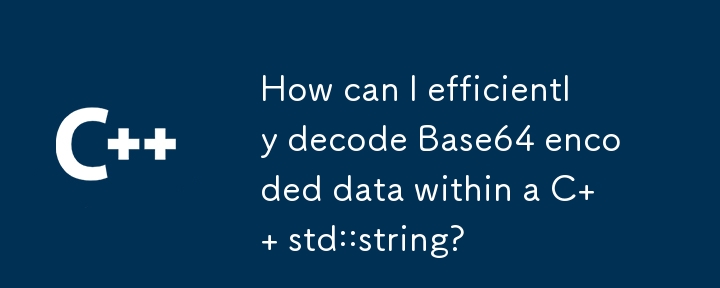

When working with data stored in binary format within a std::string object, you may encounter the need for Base64 decoding. This snippet offers a solution specifically designed for such scenarios.
The following code provides both Base64 encoding and decoding functionality:
base64.h:
#ifndef _BASE64_H_ #define _BASE64_H_ #include <vector> #include <string> typedef unsigned char BYTE; std::string base64_encode(BYTE const* buf, unsigned int bufLen); std::vector<BYTE> base64_decode(std::string const&); #endif
base64.cpp:
#include "base64.h"
#include <iostream>
static const std::string base64_chars =
"ABCDEFGHIJKLMNOPQRSTUVWXYZ"
"abcdefghijklmnopqrstuvwxyz"
"0123456789+/";
static inline bool is_base64(BYTE c) {
return (isalnum(c) || (c == '+') || (c == '/'));
}
std::string base64_encode(BYTE const* buf, unsigned int bufLen) {
std::string ret;
int i = 0;
int j = 0;
BYTE char_array_3[3];
BYTE char_array_4[4];
while (bufLen--) {
char_array_3[i++] = *(buf++);
if (i == 3) {
char_array_4[0] = (char_array_3[0] & 0xfc) >> 2;
char_array_4[1] = ((char_array_3[0] & 0x03) << 4) + ((char_array_3[1] & 0xf0) >> 4);
char_array_4[2] = ((char_array_3[1] & 0x0f) << 2) + ((char_array_3[2] & 0xc0) >> 6);
char_array_4[3] = char_array_3[2] & 0x3f;
for(i = 0; (i <4) ; i++)
ret += base64_chars[char_array_4[i]];
i = 0;
}
}
if (i)
{
for(j = i; j < 3; j++)
char_array_3[j] = '<pre class="brush:php;toolbar:false">std::vector<BYTE> myData;
...
std::string encodedData = base64_encode(&myData[0], myData.size());
std::vector<BYTE> decodedData = base64_decode(encodedData);To demonstrate the usage of this snippet, consider the following:
The above is the detailed content of How can I efficiently decode Base64 encoded data within a C std::string?. For more information, please follow other related articles on the PHP Chinese website!




